Key takeaways:
- Community forums serve as vital spaces for sharing diverse perspectives, fostering empathy, and stimulating action on issues like homelessness.
- Emotional connections formed through community support can significantly impact individuals in need, highlighting the importance of collective initiatives.
- Effective charity work requires understanding community needs, maintaining transparency, and demonstrating patience to build trust and drive real change.
- Personal stories shared in forums can inspire hope and resilience, deepening connections among those who face similar struggles.
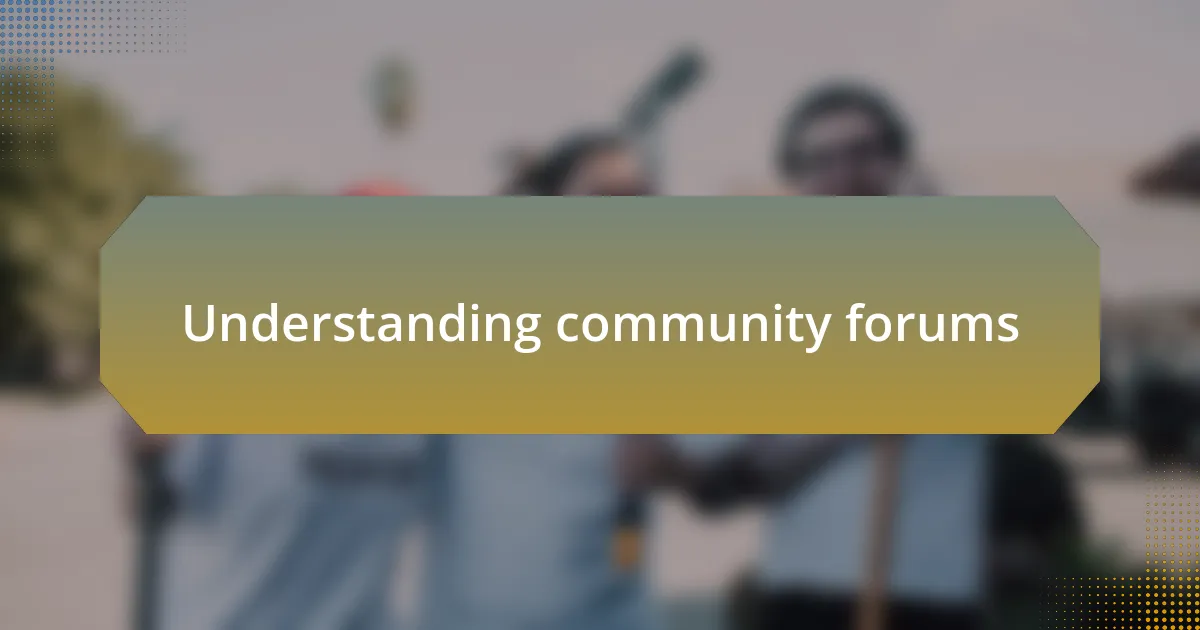
Understanding community forums
Community forums are often vibrant spaces where individuals come together to share their thoughts, concerns, and ideas. I remember my first experience in a community forum; it felt like stepping into a room full of passionate voices, each sharing their unique stories. It made me realize how essential these platforms are for fostering connection and understanding.
Many might wonder, what makes community forums so valuable? From my perspective, it’s the diverse range of perspectives that emerge in these discussions. They help me to see the complexities of issues, particularly in the context of homelessness, where each person’s experience can shed light on different facets of the problem. I especially appreciate how these forums create a safe space for empathy and support.
Engaging in community forums often leaves me feeling inspired yet humbled. I recall a heated debate about local resources for the homeless; amidst the differing opinions, there was a shared commitment to finding solutions. It illustrates how these forums can act as catalysts for action and change, encouraging participants to transform dialogue into meaningful initiatives.
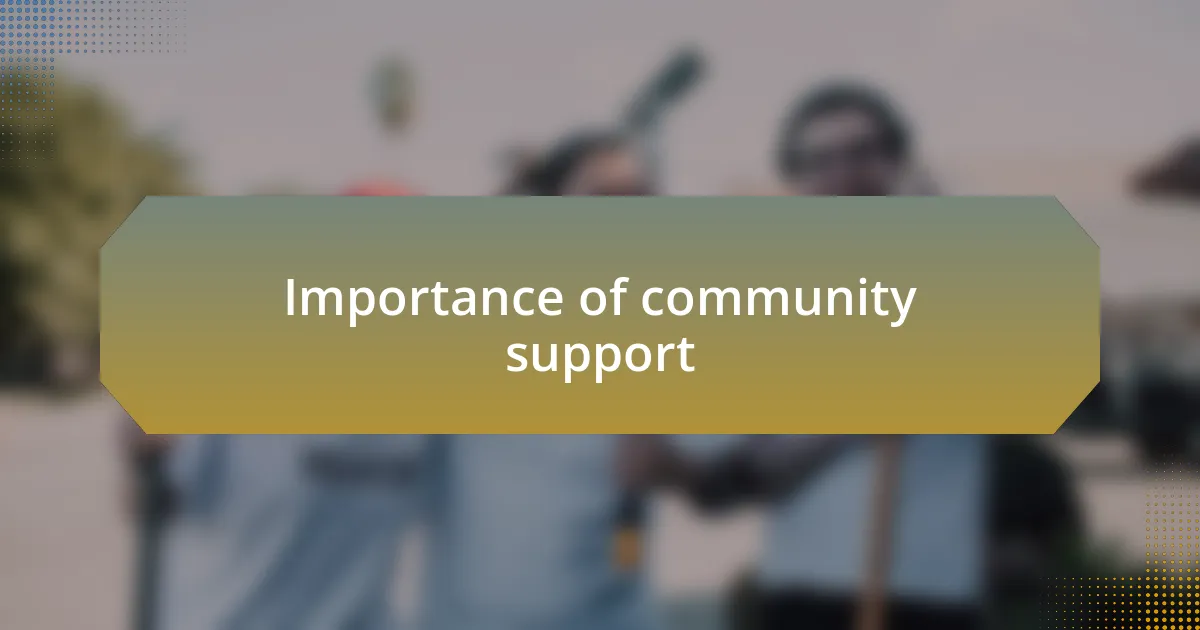
Importance of community support
Community support plays a crucial role in addressing homelessness, as it brings people together to confront a shared challenge. I recall a touching moment when someone in a forum shared how a small donation led to a life-changing experience for an individual. It made me ponder—how many lives could we impact if everyone simply contributed a bit of time or resources?
The emotional connections forged through community support can be transformative. I once participated in a local event where residents pooled their resources to provide meals and basic necessities to those in need. The gratitude on the faces of those we helped was profoundly moving, reminding me of our collective humanity. In moments like these, I often think, what if every community took such initiatives to heart?
Moreover, supporting one another fosters resilience and hope among members. When I share stories from the forums, I am struck by the resilience of individuals confronting poverty and homelessness. It’s incredible to witness this shared determination; I often wonder how far we could go if we united our efforts completely.
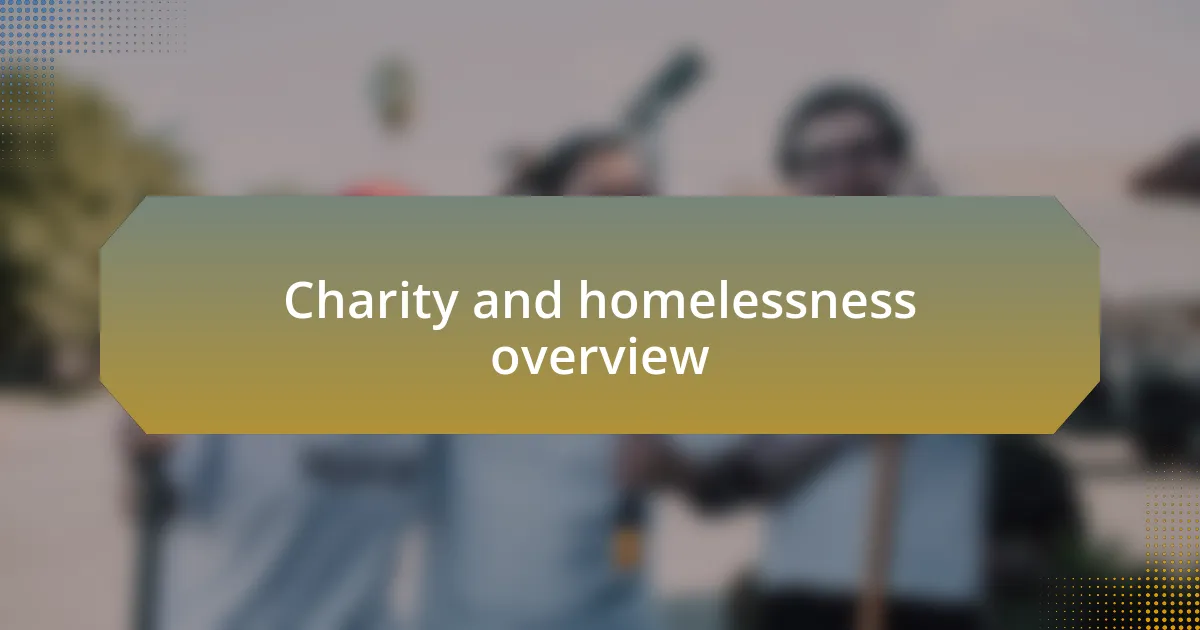
Charity and homelessness overview
Charity is often seen as a lifeline for those experiencing homelessness, but it extends beyond mere support. I remember volunteering at a shelter where a small group of us organized a donation drive. It was enlightening to see how an outpouring of kindness—clothing, hygiene items, and warm meals—could light up a person’s day. This connection between donors and recipients creates a community where everyone feels valued, doesn’t it?
The issue of homelessness is deeply intertwined with the need for compassion and understanding. One evening, while working at a charity event, I was moved by a story shared by a formerly homeless individual. Their journey from despair to stability, all thanks to charitable support, reinforced my belief that these initiatives are not just about giving; they are about rebuilding lives. How often do we take a moment to reflect on the ripple effect of our contributions?
Moreover, I’ve often found that charity initiatives can spark a sense of purpose within the community. When my local group decided to participate in a neighborhood clean-up, it didn’t just beautify the area—it also drew attention to the larger issue of homelessness around us. Engaging with those affected directly allowed us to empathize and advocate for real change. Isn’t it powerful to think that our combined efforts could inspire significant solutions?
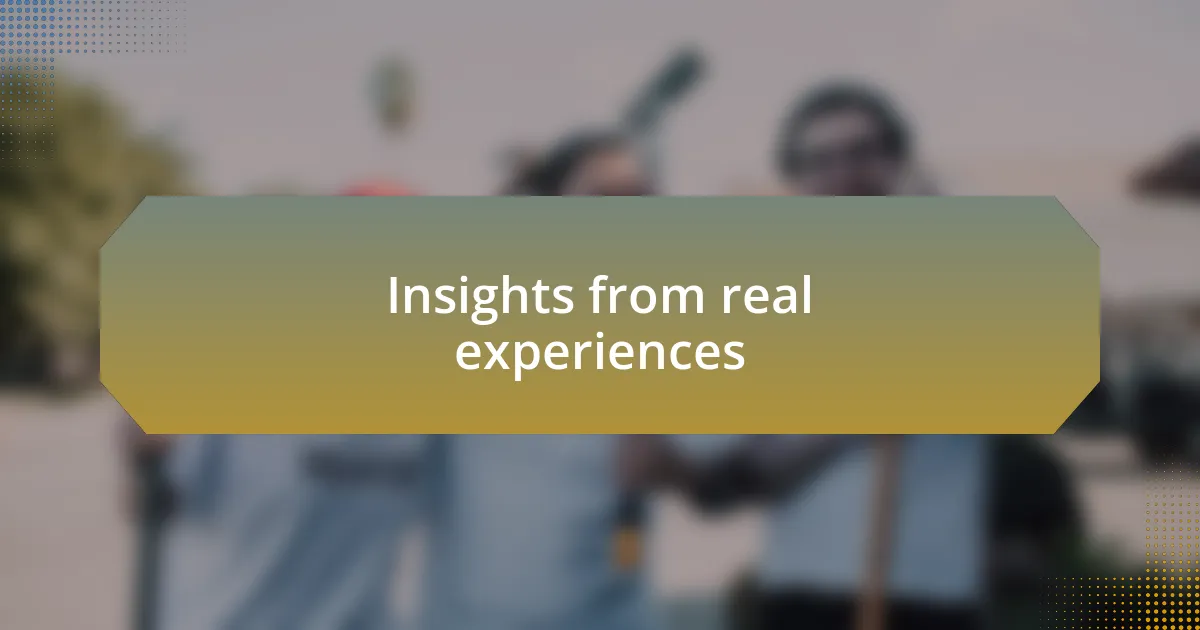
Insights from real experiences
Throughout my time interacting with community forums, I’ve encountered stories that reveal the heart of the issue. I once read about a young man who shared his experience of living in his car. The vulnerability he expressed was palpable; he described how everyday tasks, like finding a safe spot to sleep or accessing a bathroom, became monumental challenges. It made me wonder—how often do we consider these simple yet critical aspects of life?
Another poignant moment came from a mother who was trying to navigate shelter systems with her children. She described the overwhelming feeling of being judged while seeking help, which left me reflecting on my own perceptions. How can we foster environments that are more welcoming? Her story highlighted a need for compassion in the programs meant to assist those in need.
I’ve also discovered that these shared experiences often lead to actionable insights. In one discussion, a participant suggested that creating more community spaces for dialogues could help bridge gaps between those who give and those who receive. Inspired by that idea, I began to think about how our local parks or community centers could host regular gatherings, allowing stories to be shared openly. Isn’t it fascinating how a simple conversation can turn into a catalyst for change?
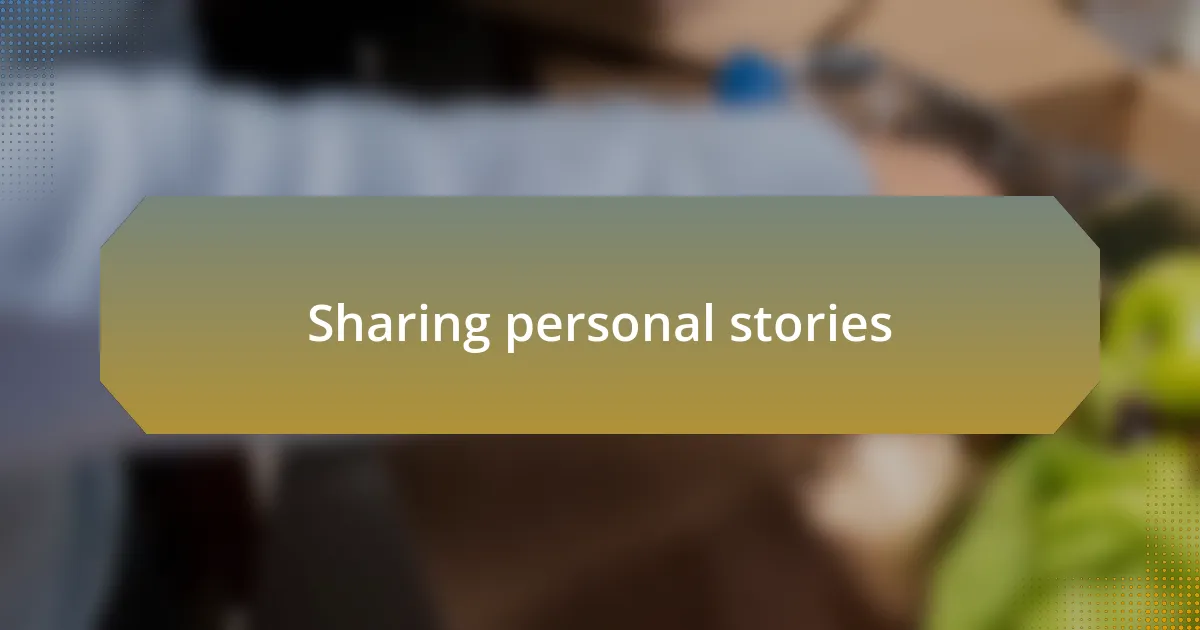
Sharing personal stories
Sharing personal stories creates a powerful connection among individuals facing similar struggles. I remember reading a post from a woman recounting her journey from stable employment to homelessness after losing her job. Her honesty about the spiral of despair and uncertainty made me realize just how fragile our situations can be. How often do we stop to think that anyone, including ourselves, could find their circumstances drastically altered in an instant?
Another story that struck me was from a veteran who talked about his fight not just against the stigma of homelessness but also against the haunting memories of his past. He described the solace he found in community forums, where sharing his truth allowed others to understand him on a deeper level. It made me question—what if we all took the time to listen? Would empathy become more widespread if we could see each other’s struggles more clearly?
These shared narratives are not just about hardship; they’re about resilience and hope. I recall a post where someone described how their life turned around after receiving help from a local charity. The gratitude they expressed sparked something in me: the realization that sometimes, by just sharing a single story, we can inspire hope in others who might feel alone. Isn’t it amazing how vulnerability can build bridges when we least expect it?
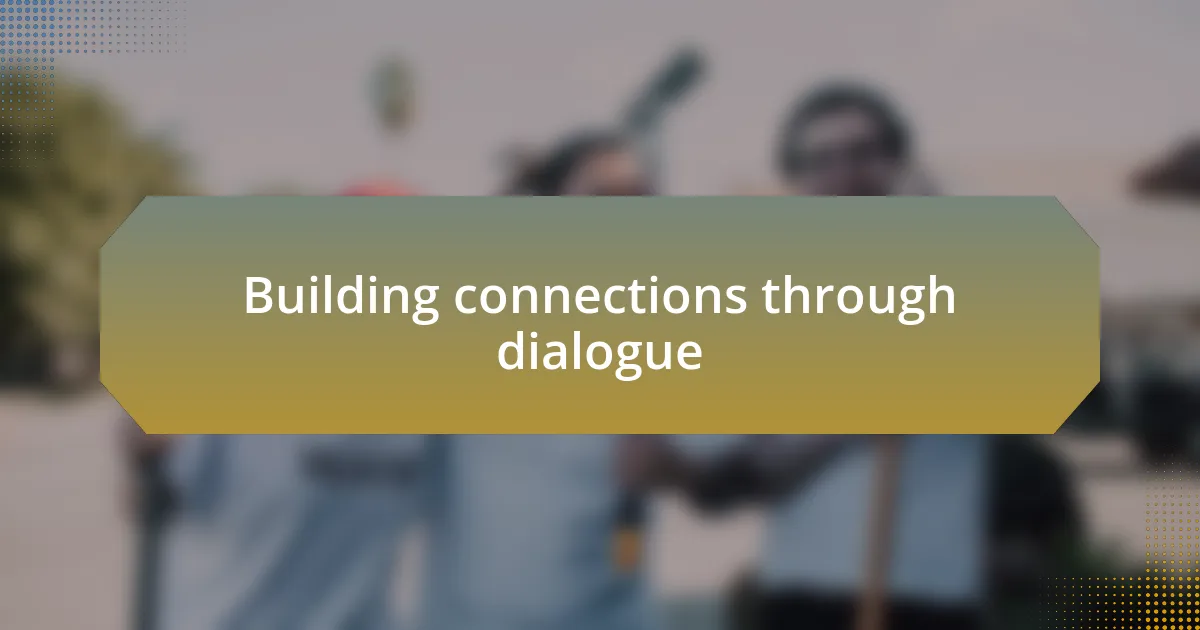
Building connections through dialogue
When I engage in community forums, I often see how dialogue transforms isolated experiences into shared journeys. One day, I came across a thread where someone expressed frustration about the lack of resources, and in the comments section, a lively exchange began. Participants weren’t just sharing facts; they were offering advice, support, and their own stories. It was enlightening to witness how voicing concerns opened the door to connections that felt genuine and grounded in mutual understanding.
I’ve also learned that dialogue isn’t just about talking; it’s about listening deeply. I remember participating in a discussion where a man explained how hearing others’ stories of resilience shifted his perspective on his own struggles. As he listened, you could almost feel the weight lifting—his burdens felt lighter knowing he wasn’t alone. How often do we underestimate the power of simply being present and attentive? It’s in those moments that we realize we’re part of something bigger, a community that thrives on shared experiences.
Navigating these forums, I have often found myself moved by the raw honesty of participants. A woman once shared her fears about regaining stability after losing her home, and her vulnerability inspired a flood of support. It made me think: what if every conversation we had could be that impactful? Building connections through dialogue isn’t just beneficial; it’s essential for healing and empowerment within our community, showing us the true strength found in unity.
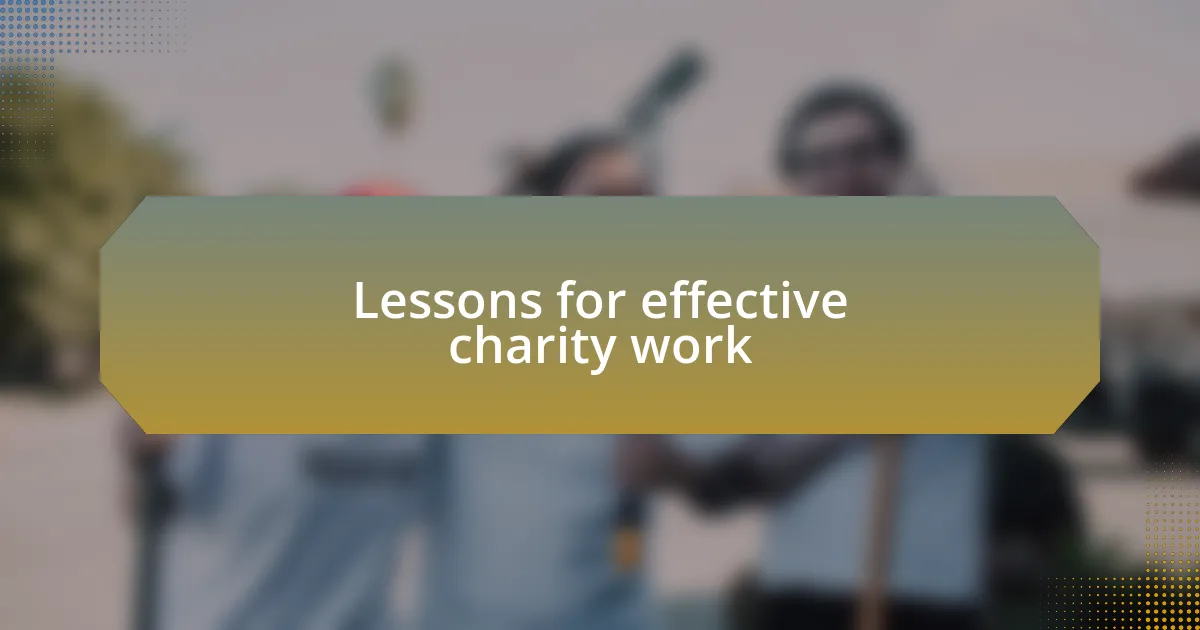
Lessons for effective charity work
Effective charity work thrives on understanding the unique needs of the communities we serve. I recall a project where a team and I hosted a needs assessment workshop, inviting individuals experiencing homelessness to share their insights. What struck me was how their firsthand accounts highlighted gaps that we, as organizers, hadn’t considered. This experience reinforced the idea that involving beneficiaries in the planning process fosters trust and ensures that our initiatives genuinely address their challenges.
Another vital lesson I’ve gathered from engaging in charity forums is the importance of transparency. After a community member voiced concerns about how funds were allocated, we created a public report detailing our expenditures. The response was overwhelmingly positive; stakeholders appreciated the openness, which reinforced their faith in our mission. It made me wonder: how often do we overlook the simplicity of clear communication in building trust?
Lastly, patience is a key ingredient in effective charity work. I remember a program aimed at job training that faced initial resistance from participants who had doubts about its efficacy. After consistently showing up, listening to their concerns, and tweaking our approach based on feedback, we slowly saw shifts in attitudes. This taught me that real change takes time and persistence. Engaging in thoughtful, responsive practices can ultimately transform skepticism into empowerment.